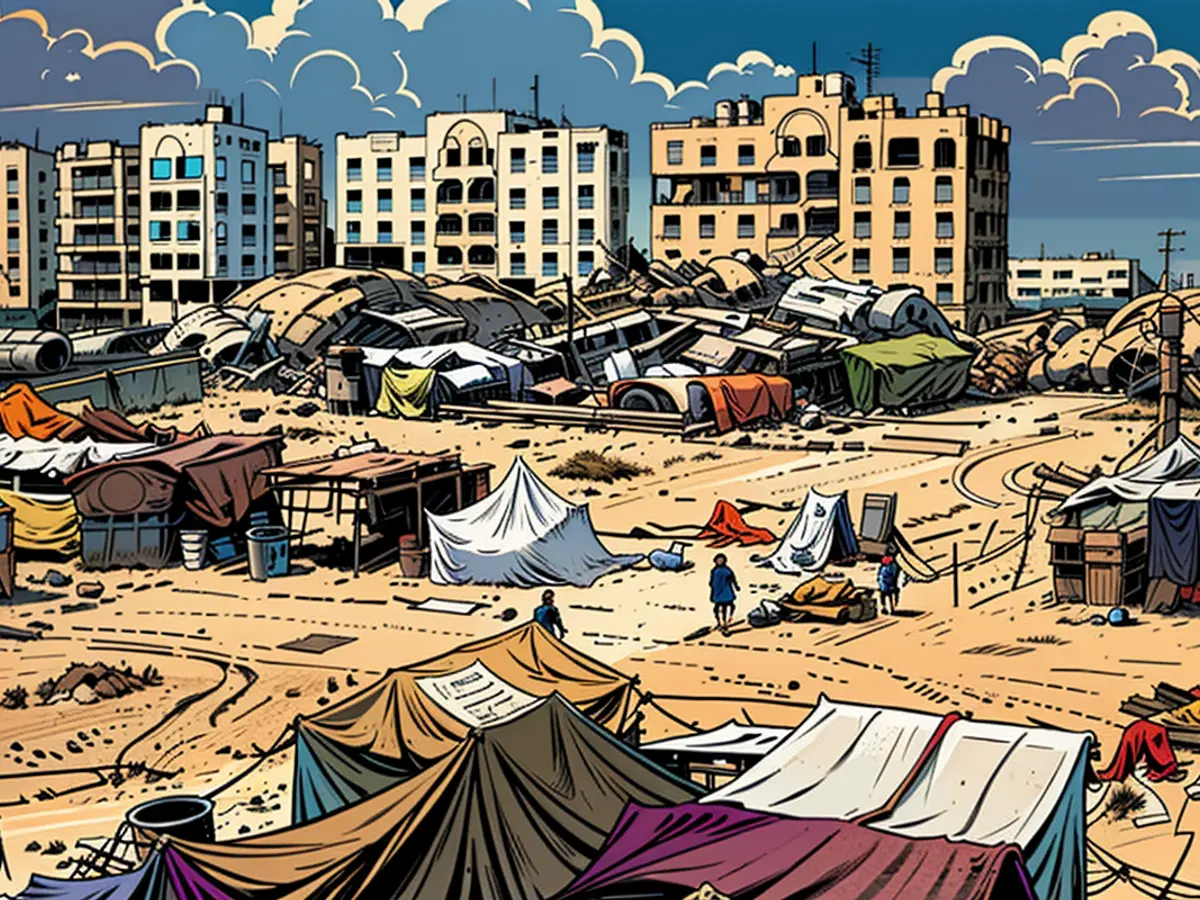Middle East Conflict - The Gaza talks should also prevent Middle East fires
Accompanied by concerns about a potential wildfire in the Middle East, crucial talks may be underway in the conflict between Israel and the Islamist Hamas. At the urging of mediators USA, Qatar, and Egypt, a negotiating round is planned for Thursday to discuss a ceasefire, once again focusing on the exchange of hostages for Palestinian prisoners. A breakthrough could also prevent a retaliatory strike by Iran against Israel, thus preventing the war from spreading far beyond the Gaza Strip.
US President Joe Biden has high hopes for these talks, which were preceded by intense mediation efforts, including those of German Chancellor Olaf Scholz (SPD). They are set to take place in Cairo or the Qatari capital, Doha. However, the participation of Hamas remained uncertain until the last moment. "We will not negotiate under fire," the dpa learned from Hamas circles. According to a report, the talks could also be conducted without the direct involvement of the group classified as a terrorist organization by the EU. Hamas and Israel do not negotiate directly with each other.
Nerve-wracking ahead of Gaza talks - Hope for success
Following the killing of a key representative of the pro-Iranian Hezbollah militia in Lebanon and the foreign chief of Hamas in the Iranian capital Tehran about two weeks ago, a major attack by Iran and its allies on Israel has been feared for days. The Islamic Republic, Hezbollah, and the Islamist Hamas in the Gaza Strip have vowed revenge.
In April, Iran attacked Israel directly for the first time in retaliation for an alleged Israeli attack on an Iranian consular building in Syria. The attack was limited - more than 300 drones, rockets, and cruise missiles were largely repelled by Israel with the support of partners and countries in the region. It is feared that there could now be a coordinated attack against Israel - together with Hezbollah, the Houthi militia in Yemen, as well as Iran-backed militias in Syria and Iraq. With an estimated 150,000 rockets, drones, and cruise missiles, Hezbollah is considered the most powerful militia in the region.
The Israeli army is on high alert and is reserving the right to take offensive measures. It can rely on the support of the USA, which has significantly increased its military presence in the region. In Iran, the USA and Israel are considered declared arch-enemies. An open military conflict between the two countries has been feared several times, especially after the killing of the Iranian top general Qassem Soleimani by a US drone strike in Iraq in 2020.
Outcome of talks uncertain - What is Iran doing?
What the talks can bring is completely uncertain. The negotiations have hardly made any progress recently. Israeli Prime Minister Benjamin Netanyahu rejected accusations that he had blocked a deal by setting new conditions or raising new demands. He accused Hamas of raising new demands. Netanyahu wants to militarily destroy Hamas, so that it is no longer able to govern the coastal region.
Netanyahu governs in a coalition with ultra-religious and far-right partners who are strictly against concessions to Hamas. His opponents accuse him of clinging to his coalition partners because he could lose in new elections. The loss of his office would in turn accelerate the criminal prosecution of corruption cases in which Netanyahu is allegedly involved.
The U.S. presented a draft deal at the end of May, initially proposing a full and unrestricted six-week ceasefire. During this period, a specific group of hostages would be released. In return, Palestinians imprisoned in Israel would be freed. Afterwards, the fighting would be permanently halted, and any remaining hostages would be released. In the final phase, the reconstruction of the Gaza Strip would begin.
Diplomats are already preparing for the possibility of Hamas not attending the planned talks. In that case, they would inform the group about the discussed conditions for an agreement, the "Wall Street Journal" quoted Arab mediators.
The mediators recently pressured Israel and Hamas to reach an agreement. They would try to be "creative and assertive to get the deal over the finish line," said John Kirby, the communications director of the U.S. National Security Council.
Iran's Dilemma: Seek Revenge or Wait for Gaza Talks?
Iran has threatened retaliation for the killing of Hamas' external operations chief, Ismail Haniyeh, nearly two weeks ago, but has not carried it out. "As a revolutionary and anti-Israel country, Iran cannot afford to forgo a retaliatory strike, but it is also aware of the disastrous consequences of a military response," explains a Tehran-based political scientist.
A war would exacerbate Iran's economic crisis and could lead to renewed unrest. Tehran would also have to reckon with U.S. involvement as Israel's main ally and an Israeli response. After Iran's attack in April, Israel responded with a limited strike, allowing Iran to refrain from a counter-reaction. However, some observers saw Israel's attack on an airbase near Iranian nuclear facilities in the province of Isfahan as a clear message to Iran that an attack on nuclear sites is possible.
Iran's nuclear facilities, especially those in Natanz in central Iran and Fordo south of Tehran, are considered potential targets by Israel and its allies. Iran claims that these facilities, particularly those in Natanz and Fordo, are militarily well-protected.
So far, statements from Tehran suggest that Iran may refrain from retaliation at least until after the Gaza talks, says the Iranian political scientist. "After that, we will see if the regime chooses to stick to a blood feud or opt for a political solution."
The ongoing conflict between Israel and Hamas has led to crucial talks about a potential ceasefire, with fears of a retaliatory strike from Iran against Israel if a breakthrough is not achieved. However, the participation of Hamas in these talks remains uncertain, as they have stated they will not negotiate under fire.








